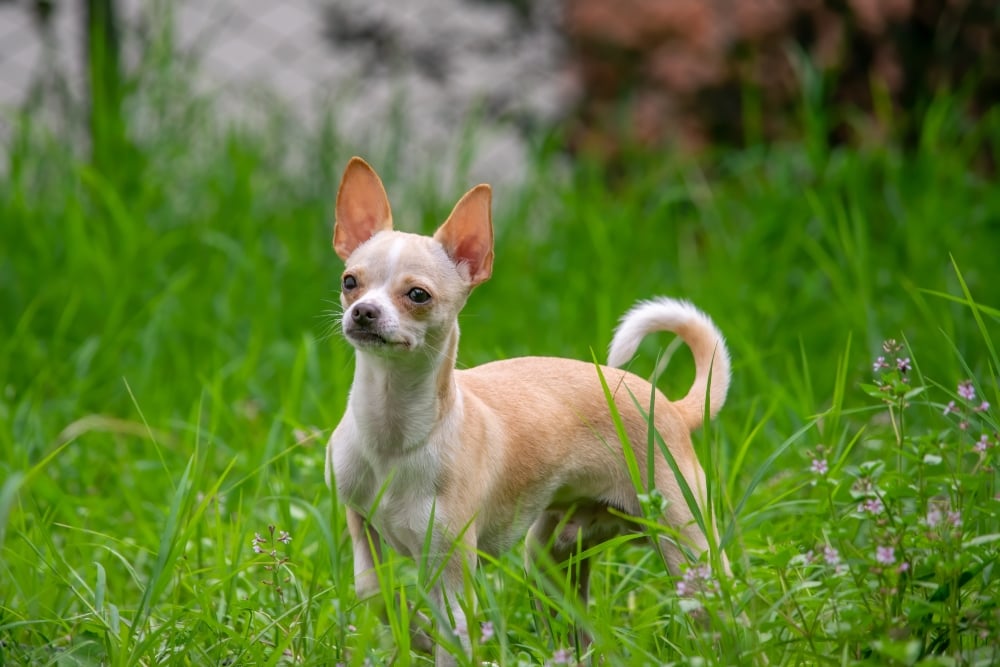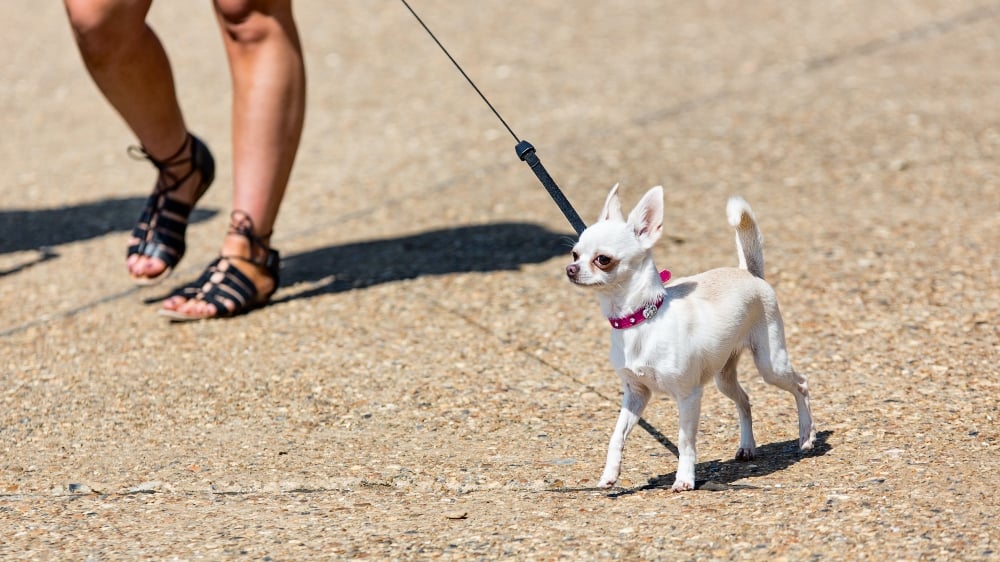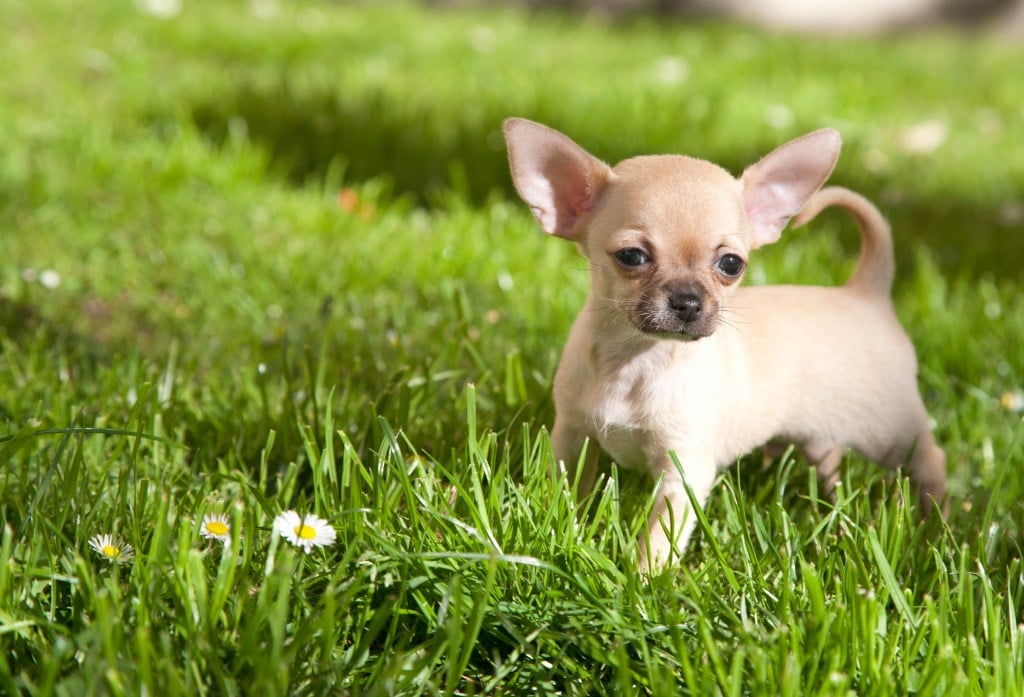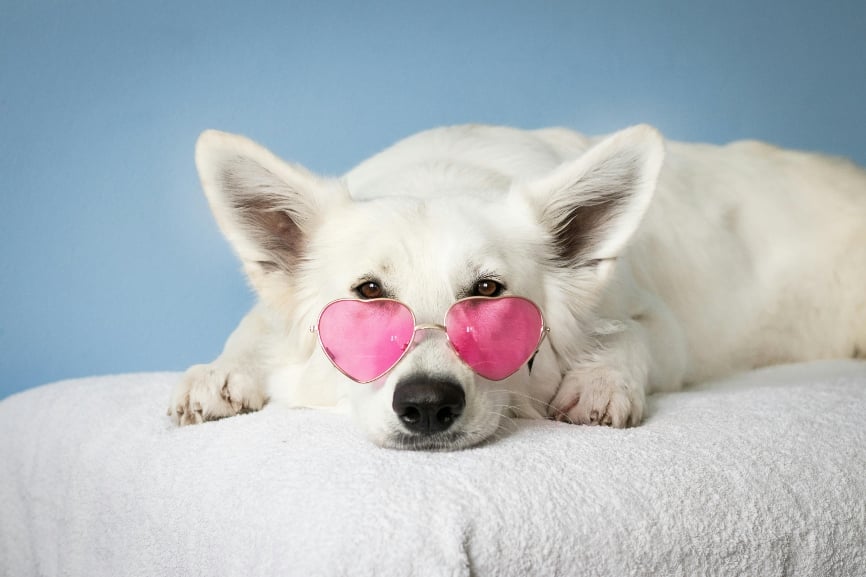Table of Contents
Introduction to Chihuahuas
What Chihuahuas lack in size, they definitely make up for in personality and charm! This small and popular breed of dogs is fun to learn about and get to know on a personal level. Although these “purse-size dogs” are famous for being trendy companions, they are also one of the oldest breeds of dogs in the Americas. These are ideal dogs for city environments and warm climates, and they’re skilled enough to learn agility training too.

Size of Chihuahuas
One of the most defining characteristics of a Chihuahua is its small size because to be a purebred Chihuahua, this dog’s weight should not exceed six pounds. These dogs can be as lightweight as four pounds if they are Teacup Chihuahuas or over 12 pounds if they are a mixed breed. There is only a minimal difference in size between male and female Chihuahuas.
Here’s how big you can expect your Chihuahua to get according to age.
| Birth | 1 month | 3 months | 5 months | Final Adult Weight |
|---|---|---|---|---|
| 2.5 – 5.5 ounces | 7 – 21 ounces | 15 – 52 ounces | 24 – 78 ounces | 2 – 6 pounds |
Chihuahuas typically reach their full adult weight between six and nine months of age. This is typical of small dogs and in contrast to large breeds that don’t reach their full weight until a year and a half to two years old. A fully-grown Chihuahua is between five and eight inches tall.

Characteristics of Chihuahuas
Aside from the Chihuahua’s size, this breed is unique because of its pointy ears, expressive eyes, and round head. Despite their small size, they can actually be excellent watchdogs. And yet, these dogs are very affectionate with people and love being close to their family members too. Just make sure to keep small children away from Chihuahuas because these delicate pups aren’t sturdy enough for roughhousing.
As you get to know a Chihuahua’s personality, here’s what you can expect based on his or her breed characteristics.
| Breed Characteristic | Level (High, Medium, Low) |
|---|---|
| Affectionate with People | High |
| Good with Young Kids | Low |
| Good with Pets | Low |
| Need for Exercise | Low |
| Energy Level | Medium |
| Intelligence Level | Medium |
| Able to Be Trained | Medium |
| Amount of Barking | Medium |
| Amount of Shedding | Low |
Chihuahuas are well-suited for apartment living but are very temperature-sensitive, which means you’ll need to keep them protected during hot and cold weather. Besides the fact that Chihuahua outfits are just cute, this is why you often see Chihuahuas wearing shirts and sweaters when they’re out and about.
You should know that Chihuahuas often think they are bigger than they really are and can refuse to back down from a larger dog if not socialized early in life. These dogs fit into households best when there are some rules in place, otherwise you could find your whole life being run by this tiny, adorable pet!
History of Chihuahuas
The Chihuahua is named after the Mexican state of Chihuahua and the smallest recognized breed of dog in the world. Historians believe that the origin of the Chihuahua dog dates back to the 12th century when the Aztecs conquered the Toltecs and refined their breed-of-choice, the Techichi, into a smaller and lighter type of dog. These dogs were very popular in Aztec culture in the 1500s and gained broader popularity in the mid-1800s. A Chihuahua named Beppie was the first American Kennel Club-registered Chihuahua in 1908.
Chihuahuas have been very popular in U.S. households since the 1960s and the pride and joy of many celebrities. These photogenic pups have been toted around on leashes, in arms, and inside handbags in many movies and TV shows over the years. The fast food restaurant, Taco Bell, has featured a Chihuahua in its commercials, bringing even more worldwide recognition and affection for this breed.

Chihuahua Standard Information
The Chihuahua is a breed that is recognized by the American Kennel Club, and accordingly, there are certain standards that a dog must live up to in order to be considered a purebred Chihuahua. This includes staying within specific weight requirements, body shapes, and general appearance guidelines.
Here is an overview of the breed standard information for Chihuahuas.
Head:
- Round “apple dome” skull
- Saucy expression
- Full and round eyes
- Large and erect ears
- Moderately short and slightly pointed muzzle
- Level or scissors bite
Neck, Topline, Body:
- Gracefully sloping and slightly arched neck
- Level topline
- Rounded, well-sprung ribs
- Moderately long tail
Forequarters:
- Lean and sloping forequarters
- Small and dainty feet with toes split but not spread
Hindquarters:
- Muscular hindquarters with hocks well apart
- Angulation that equals forequarters
Coat:
- Can be smooth coat or long coat
- Smooth coats soft, close, and glossy
- Long coats flat or slightly wavy with an undercoat preferred
- Fringed ears
- Full and long tail

Color:
- Any color adheres to standard
- Can be solid, splashed, or marked
Gait:
- Firm and sturdy movement
- Hocks parallel to each other
- Topline firm and backline level during movement
Caring for Chihuahuas
It is a common misconception that just because Chihuahuas are small, they don’t need exercise. But in fact, these dogs need about 30 minutes of exercise per day to burn off all that energy and get the enrichment they need to thrive. It is especially important to monitor these dogs’ activity when the weather is especially hot or cold outside.
Here are some general tips for taking the best care of a Chihuahua.
Best Living Environments:
- Apartments and small spaces are fine
- Surrounded by loving family members
- Should always sleep inside and not outdoors
Type of Exercise:
- Indoor or outdoor exercise work well
- Playtime in a backyard or indoor space
- Walks on a leash
- Chasing squirrels
- Retrieving small toys
Mental Enrichment:
- Agility training courses
- Playtime, praise, and treat-based rewards for good behavior
- Socialization with other dogs
Training Strategies:
- Generally easy to train with a consistent schedule
- Can be crate-trained to prevent destruction while you are out, but should only spend a few hours at a time in a crate
Grooming Tips:
- Prone to shedding
- Brush regularly to prevent matting of fur
- Have coat trimmed every few months
- Brush teeth daily, if possible (several days a week also works)
- Nails grow quickly, so keep trimmed short
- Grooming should take only a few minutes per week
Common Health Problems of Chihuahuas
Something wonderful about Chihuahuas is that this is a breed with longevity and that has a life expectancy of about 14 to 16 years. Many Chihuahuas can live 18 years or even longer if they are taken good care of during their lives.
However, the Chihuahua is predisposed to certain conditions because of the dog’s genetic makeup and small size. This includes neurological diseases and leg problems related to the kneecaps.
These are some of the most common health issues that arise with Chihuahua.
- Patellar luxation (also known as slipped stifles)
- Heart murmurs caused by weak or deformed heart valves
- Hypoglycemia, which is common in many small breeds
- Open fontanel if a puppy’s soft spot on the head doesn’t fully close
- Trembling and shivering due to temperature or stress
- Collapsing trachea because of weak tracheal cartilage
- Dental disease, caused by a small mouth and teeth crowding
To have the healthiest Chihuahua possible, make sure to get your Chihuahua from a responsible breeder if you choose to buy your dog as a puppy rather than adopting one at a shelter.
At annual vet checkups, make sure to have your Chihuahua’s eyes, heart, and knees checked for any issues, along with having the routine blood work, fecal exam, and urinalysis performed. The annual vet checkup is also a good time to get your Chihuahua up to date on all of their vaccinations and, if necessary, purchase heartworm and flea and tick preventatives.
Diet and Nutrition for Chihuahuas
Chihuahuas are known to be fussy eaters, so you might have to try a few different foods to find one that your pup enjoys and will eat regularly. These dogs typically eat ¼ to ½ cup of dry dog food per day, but the amount required will depend on your Chihuahua’s size, age, and level of activity.
Some of the most highly rated dog foods for Chihuahuas include Wellness Complete Health Small Breed Adult, and Canidae Pure Small Breed Recipe. A Chihuahua is ready to switch from puppy food to adult dog food by about 9 to 12 months of age. When a Chihuahua reaches 11 years of age, talk with your vet about switching to a senior dog food to meet your dog’s changing dietary and health needs.
 Where to Adopt or Purchase Chihuahuas
Where to Adopt or Purchase Chihuahuas
If you want to purchase a Chihuahua puppy, look at the AKC Marketplace for a list of puppies from AKC-registered litters and responsible breeders who adhere to strict rules and regulations. There are also many rescue groups that can introduce you to Chihuahuas for adoption and fostering. If you choose to adopt an adult Chihuahua, you may be able to skip the challenging puppy phases of initial socialization, obedience training, and housebreaking. A few resources to check out are the Chihuahua Club of America, Chihuahua Rescue, and PetFinder.
Related Breeds
If you like the idea of having a Chihuahua as a companion, you might also be interested to learn about other small dogs that suit your lifestyle. Here are some related breeds of dogs to learn about if the Chihuahua has caught your attention.
- Russian Toy
- Papillon
- Xoloitzcuintli
- Japanese Chin
- Manchester Terrier Toy
- Brussels Griffon
- Chinese Crested Dog
Pet Insurance for Chihuahuas
The small but mighty Chihuahua needs your help to stay active, healthy, and happy for many wonderful years. One of the best things you can to do safeguard your Chihuahua’s health is to get pet insurance with Healthy Paws.
We have helped many pet parents just like you handle the expenses of their Chihuahua’s medical treatments with an easy claim process, speedy payouts, and no costly add-ons. You can choose any licensed veterinarian you like for your Chihuahua’s care and have no maximum limits on claim payouts or any per-incident, annual, or lifetime caps on coverage.
To learn more about why Chihuahua lovers choose Healthy Paws, browse through our customer reviews and pet insurance comparison chart that shows our coverage side-by-side with options from other insurers. Review rates and get your Chihuahua pet insurance quote today!







